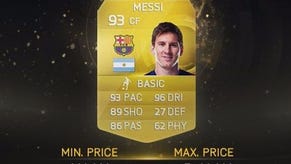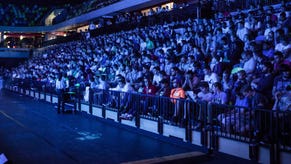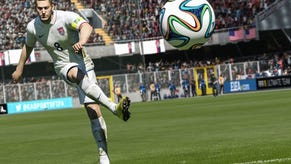FIFA 15 review
Teenage kicks.
Football is a contradictory sport. It's a culture that expresses itself best through the kinships and rivalries of local communities, yet embraces globalism like no other pastime. A world that makes millionaires of its participants, yet through its veneration of supporters claims a special bond with the common man. A team game of predictable shapes and patterns that hinges on unpredictable individuality.
It's perhaps fitting, then, that FIFA too is a franchise built on contradictions. A conservative, mega-budget series that radically changes its engine on an almost annual basis. A boxed product that (one suspects) makes most of its money from an online spin-off. A game that improves on itself every year, but never really moves forward at all.
It's this conflict more than any other that dominates my thoughts after a week with FIFA 15. Next-gen aesthetic improvements aside, is it any better a gameplay experience than any FIFA before it? More pertinently, is it even possible to say?
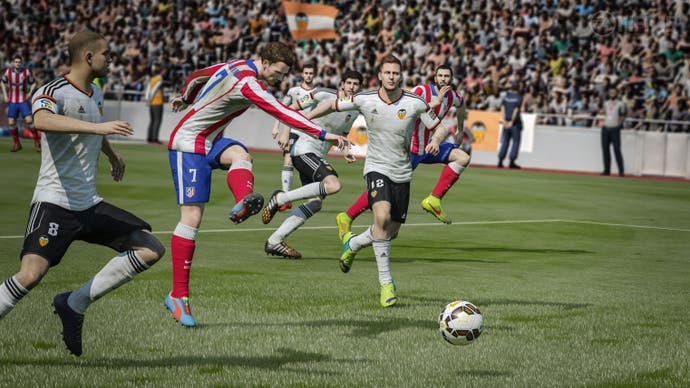
Let's start with the certainties. FIFA 15 is, in purely technical terms, stunningly impressive. The player models, though a little top heavy, have taken another huge stride towards photorealism, and the renewed match atmosphere effects - team sheets being read out, player emotions, licensed stadiums, authentic terrace chants, to name but a few - combine to create a real wow factor for the first few games you play.
This is, lest we forget, the first fully-fledged next-gen release for the series, and you sense EA has decided the best way to catapult the series forward is to lob the proverbial kitchen sink into our living rooms, cramming in two or three years' worth of updates all in one go.
The new features and improvements are too numerous to describe comprehensively. But the overwhelming impression is of the enormous amount of care taken by a team that has a fan's appreciation of the game. While this may be authenticity only in the sense that it replicates the matchday experience as invented by Sky in 1992, the fluent televisual dialogue of replays, pop-backed montages and quick cuts add a real sense of drama. Slot in a few games of FIFA between Super Sunday matches and the transition is seamless.
But can you remember what the crowd looked like on PES5? Or how realistic the grass looked on FIFA 10? It seems strange that sport games are so often sold on their appearance when, unlike almost any other genre, its target audience has such a clear idea of the real-life experience the game is trying to recreate. Consider how many gamers will have kicked a football compared to firing a gun. Then think about how far we still seem to be defining from how a football game should feel to play.
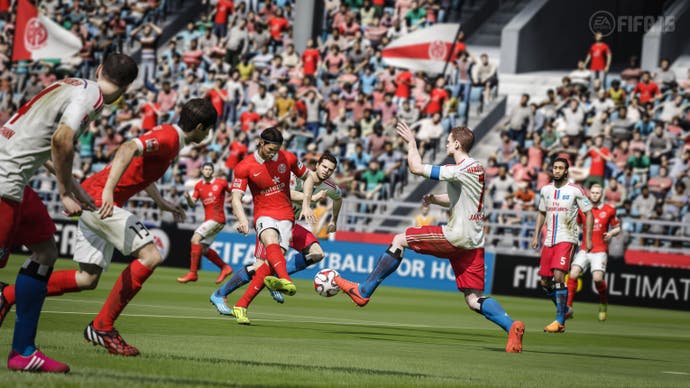
FIFA 15's game engine is so different to last year that it lends the impression not just of development teams working completely independently of each other, but also of a series sorely lacking this sense clear sense of direction or identity. What should a football game be like? "Different to last year" seems to be the only answer at the moment.
Where FIFA 14 at times resembled a game of rugby, with impenetrable banks of four colliding and pace nerfed to the point that even the fastest player couldn't escape a marker without a 10-yard head start, FIFA 15 is almost the opposite. Passing is rapid-fire, with only light caresses of the control pad allowing you to weave slick triangles through the opposition's midfield, and the speed of your players is utterly critical to success, much like it has been in some previous iterations.
To begin with, having the freedom to zoom past defenders is exhilarating. In real life, after all, Raheem Sterling could knock the ball past most left-backs in the league and reasonably expect to outrun them. You needn't even use right-stick skill moves - the new dribbling controls mean even FIFA novices can change direction, at speed, and find themselves easily breaking between lines.
Exhilaration turns to anxiety, however, when the boot is on the other foot and attack turns to defence. Even relatively low-skilled players can pivot and sprint with ease, and when even Leon Osman can repeatedly waltz his way into your six-yard box you can't help but feel that some kind of balance has been lost.
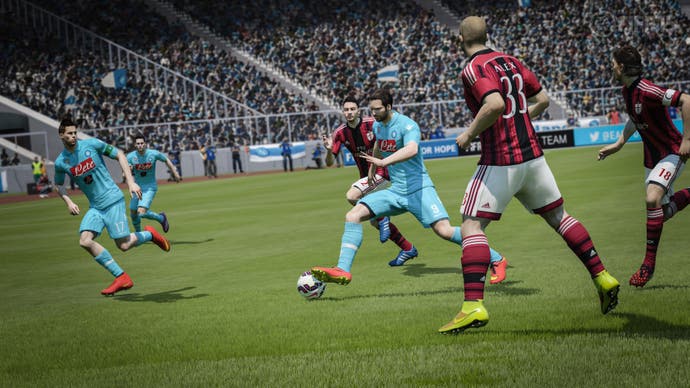
This, in part, is due to big changes to defending controls, in particular making slide tackles much less effective and preventing lazy players from hammering the 'contain' button to block opponents around their box. Defending now requires more skill and concentration than attacking, and for those of us who have neglected this side of the game over the years, it's a pretty sharp learning curve.
The knock-on effect of this bias towards attacking is that more chances are created and EA has had to make shooting much trickier to compensate for this change. In FIFA 14 the goals themselves were relatively easy to come by if you were in the right place and chose the right kind of shot. It was getting that space in the first place that was the challenge. Now the trajectory of the ball seems much less predictable, and power much harder to control, with rebounds from the goalie a much bigger part of play. My main tactic for scoring was to sprint past a full-back, tap shoot from a narrow angle and then bury the loose ball once spilled by the keeper. It's the nature of any game, football or otherwise, to have exploits, but this feels like a particularly dissatisfying one.
The goalkeeper system was long overdue a rewrite and much more natural behaviours are now evident in everything, from adjusting to changes in the flight of the ball after diving, to more sensible sweeper-keeper actions. These unprompted, Manuel Neuer-like charges from the penalty area, combined with much less predictable ball movements, affect tactics too, all but negating the chipped through-ball as the crutch of lazy FIFA players worldwide. Opposition and team-mate AI is also significantly more advanced, meaning runners are often tracked by defenders beyond third and fourth passes and strikers will find space with much greater frequency.
Like the chipped through-ball, crossing is more erratic, hopefully ending the back-post header (and, to some extent it seems, corners) as the cheapest of cheap goals to concede in competitive online play. What you end up with is matches that are utterly frenetic, with slippery dribblers almost impossible to stop but much less likely to score after breaking through. Every game is end-to-end and, accordingly, many will find it a more exciting experience than last year - even if outcomes seem to be often decided by luck.
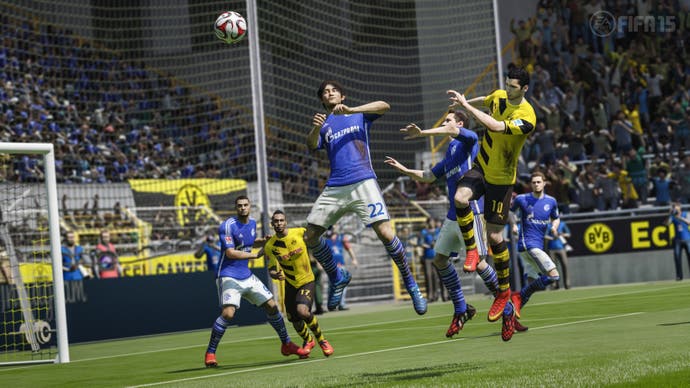
So, the $64,000 question - is FIFA 15 better to play than last year? The short answer is no. It's so different that it will frustrate as many fans as it delights, based on their different approaches to the game.
But ask another question. Would we want FIFA, like Call of Duty, to have nailed-down mechanics that gets infinitesimal tweaks each year? Again, the answer is probably no.
Relearning FIFA each year has become part of its appeal. The mystery is whether or not this is something deliberate on EA's part, or whether, and I think this is much more likely, their developers are stuck in a holding pattern, balancing and rebalancing between pace and technique each year, responding to community complaints and pressure to deliver annual products of sufficient variance. If I had to put money on it, I'd say that FIFA 16, like FIFA 14, will blunt pacy players and then tell us it's an improvement. But nothing is being improved if there's no clear end point in sight.
That, perhaps, is FIFA's defining contradiction. EA can quite fairly claim to have again delivered the best football game ever made. But every year the developers seem to have less of an idea what that means.


